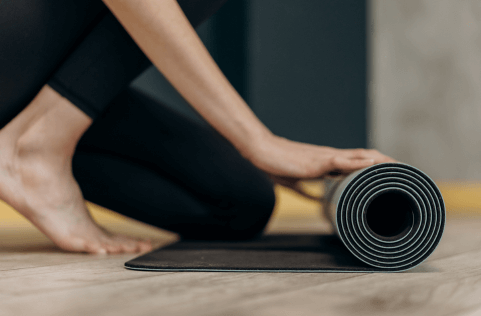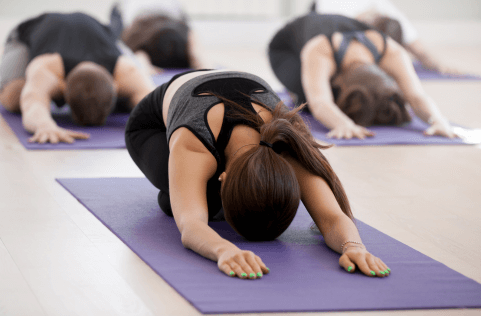Yoga has long been celebrated for its ability to nurture both the body and mind. For individuals in eating disorder recovery, yoga can be an especially powerful tool. It offers a unique blend of physical postures, breathing exercises, and mindfulness that help cultivate self-awareness, self-compassion, and body neutrality—three essential pillars of healing.

the mind body connection in eating disorder recovery
Eating disorders are complex mental health conditions that often involve a distorted relationship with food and one’s body. Whether it’s anorexia, bulimia, or binge eating disorder, these conditions are deeply tied to emotional pain, anxiety, and trauma. The mind and body become disconnected, and many individuals struggle to find balance in both areas.
Yoga, which emphasizes the unity of body, mind, and spirit, can be transformative for those on the road to recovery. Through mindful movement and breath, yoga can help individuals reconnect with their bodies in a compassionate way. Rather than focusing on “perfecting” a pose or achieving a certain look, yoga encourages practitioners to tune into their sensations, notice how they feel, and cultivate a sense of peace and acceptance.
how yoga supports eating disorder recovery
1. building body awareness
Yoga encourages participants to listen to their bodies. In eating disorder recovery, body awareness is often lost or severely impaired. Yoga helps to restore this connection by guiding individuals to focus on physical sensations without judgment. This is essential for people recovering from eating disorders, as they may have spent years dissociating from their physical selves.
The practice of yoga asks individuals to notice how their bodies feel during poses—whether it’s a gentle stretch or a challenging balance. Through consistent practice, individuals can learn to trust their bodies again, rebuild their relationship with food, and feel more comfortable inhabiting their own skin.
2. reducing anxiety and stress
Eating disorders often stem from or are exacerbated by underlying stress and anxiety. Yoga is known for its calming effect on the nervous system, particularly through breathing techniques such as deep diaphragmatic breathing. By slowing the breath and focusing on the present moment, yoga helps activate the parasympathetic nervous system, which promotes relaxation and reduces feelings of tension.
Many people recovering from eating disorders experience intense emotions, including fear and anxiety surrounding food, weight, and body image. The mindfulness component of yoga allows individuals to stay grounded and present, helping to manage these difficult emotions without becoming overwhelmed.

3. cultivating self compassion
One of the most powerful aspects of yoga is its ability to foster self-compassion. The practice teaches that it’s okay to be imperfect and that self-judgment only hinders progress. Yoga encourages practitioners to accept their bodies as they are, which can be a radical shift for individuals struggling with eating disorders.
In the context of recovery, yoga serves as a reminder that healing is a process, and it’s important to be kind to oneself along the way. For many, yoga offers a safe space to practice self-acceptance and move away from the critical thoughts that fuel disordered eating behaviors.
4. enhancing emotional regulation
An eating disorder can often be a way to cope with overwhelming emotions. Yoga offers an alternative approach to emotional regulation by providing tools to process emotions in a healthy, non-destructive way.
Through mindfulness, meditation, and movement, yoga teaches individuals to observe their thoughts and feelings without getting consumed by them.
Over time, yoga helps individuals develop the emotional resilience needed to navigate the ups and downs of recovery. It encourages a non-reactive attitude, which can be incredibly empowering when faced with triggers or challenging situations related to food or body image.
5. promoting flexibility and strength
Physical strength and flexibility aren’t just important for improving the body; they are also symbolic of the resilience needed in recovery. Yoga offers both mental and physical challenges that can help individuals gradually rebuild strength in both areas. Through consistent practice, people recovering from eating disorders can reclaim their physical strength and develop a healthier relationship with their bodies.
Yoga’s gentle, restorative postures can be especially helpful for those who may be physically weakened after long periods of disordered eating. As the body becomes stronger, so too does the mind, fostering a sense of accomplishment and pride that can be incredibly healing.

practical tips for incorporating yoga into eating disorder recovery
If you’re considering adding yoga to your recovery journey, here are a few tips to help you get started:
start slow
If you’re new to yoga or haven’t practiced in a while, start with gentle or restorative classes. Listen to your body and take breaks when needed.
focus on breath
The breath is a central element of yoga practice. Pay attention to your breath as you move through poses, and use it to calm your mind and reduce anxiety.
find a trauma-informed instructor
If possible, find a yoga teacher who is experienced in trauma-informed care. They will create a safe and supportive environment, recognizing that certain poses or movements may trigger emotional responses for individuals in recovery. We've included some options for trauma-informed trainers through the Trauma Sensitive Yoga program here.
be kind to yourself
Recovery is a journey, and yoga is not about perfection. If you find yourself feeling frustrated or critical, gently bring your focus back to the present moment and practice self-compassion.
use yoga as a compliment therapy
Yoga is a wonderful complement to traditional eating disorder treatment, including therapy and support groups. It can enhance the work you're doing in other areas of recovery.

how nourishrx can support you
Yoga is more than just a physical practice; it’s a path to mental and emotional healing. For individuals recovering from eating disorders, yoga provides an opportunity to reconnect with the body, reduce stress, and cultivate a mindset of compassion and acceptance. While it’s not a replacement for professional treatment, yoga can be a powerful tool in the healing journey.
If you're considering yoga as part of your recovery, remember that it’s not about achieving a specific pose or looking a certain way; it’s about honoring your body, embracing your unique journey, and finding peace within.
Contact our office today to see how our expert dietitians can support your recovery journey, no matter where you are in the process.
Comments Off on Yoga and Eating Disorder Recovery: A Path to Healing